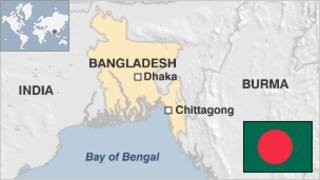
Bangladesh is one of the world's most densely populated countries, with its people crammed into a delta of rivers that empties into the Bay of Bengal.
Poverty is deep and widespread, but Bangladesh has in recent years reduced population growth and improved health and education.
Formerly East Pakistan, Bangladesh came into being only in 1971, when the two parts of Pakistan split after a bitter war which drew in neighbouring India.
Bangladesh spent 15 years under military rule and, although democracy was restored in 1990, the political scene remains volatile.
Islamist extremism has been rising in the usually tolerant country.
ADVERTISEMENT
The low-lying country is vulnerable to flooding and cyclones, and stands to be badly affected by any rises in sea levels.
Read more country profiles - Profiles by BBC Monitoring
FACTS
People's Republic of Bangladesh
Capital: Dhaka
Population 162 million
Area 143,998 sq km (55,598 sq miles)
Major language Bengali
Major religion Islam, Hinduism
Life expectancy 69 years (men), 70 years (women)
Currency taka
UN, World Bank
Getty Images
LEADERS
President: Abdul Hamid
Abdul Hamid, formerly the Speaker of parliament, was elected unopposed to the ceremonial post in 2013. He was elected unopposed for the second consecutive term in February 2018.
Prime minister: Sheikh Hasina
Sheikh Hasina started a third term as prime minister in January 2014 after her Awami League won elections boycotted by the opposition amid an ongoing political crisis.
Politics has long been dominated by bitter rivalry between two women: Sheikh Hasina and Khaleda Zia of the Bangladesh Nationalist Party.
Both have been prime minister at various times since 1991.
Their hostility stems in part from differences over who played a greater role in the country's independence struggle - Hasina's father, Sheikh Mujibur Rahman, or Khaleda Zia's husband, General Ziaur Rahman.
They sank their differences when military ruler Hossain Mohammad Ershad was in power from 1982 to 1990, but they have been uncompromising rivals ever since.
MEDIA
Image caption
Media outlets tend to be polarised, aligning themselves with one or other of the main political factions.
Four bloggers who criticised religious fundamentalism were murdered in 2015. One of them was reportedly on a hit-list of bloggers published by a Bangladeshi Islamist group at the end of 2014.
Read full media profile
TIMELINE
Some key dates in the history of Bangladesh:
1947 - British colonial rule over India ends. A largely Muslim state comprising East and West Pakistan is established, either side of India. The two provinces are separated from each other by more than 1,500 km of Indian territory.
1971 - Independence after a nine-month war, with India backing the Bengali nationalists against Pakistan.
1973 - First parliamentary elections give the Awami League a landslide victory.
1975 - A military coup sees founding president Sheikh Mujibur Rahman and most of his family members killed, putting an end to civilian rule.
1979 - Second parliamentary elections brings former army chief Ziaur Rahman's Bangladesh Nationalist Party (BNP) to power.
1981 - Ziaur Rahman assassinated during abortive military coup.
1982 - General Ershad assumes power in army coup. He suspends the constitution and political parties.
1991 - The country returns to a parliamentary system of government.
2014-17 - Bangladesh faces a campaign of high-profile violence by Islamists against bloggers, atheists and secular intellectuals.
Read full timeline
Image caption
Bangladesh emerged as
Hi! I am a robot. I just upvoted you! I found similar content that readers might be interested in:
http://www.bbc.co.uk/news/world-south-asia-12650940
ok
Congratulations @ahamedfoysal442! You have completed some achievement on Steemit and have been rewarded with new badge(s) :
Click on the badge to view your Board of Honor.
If you no longer want to receive notifications, reply to this comment with the word
STOPthank you